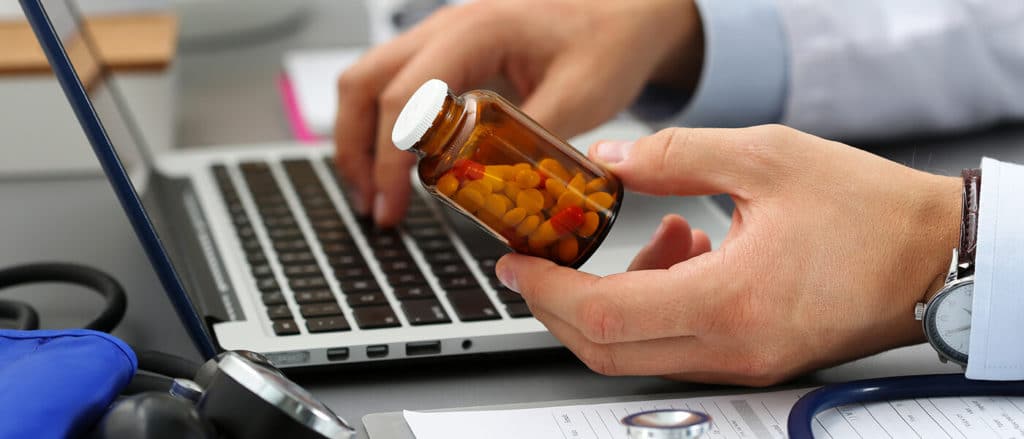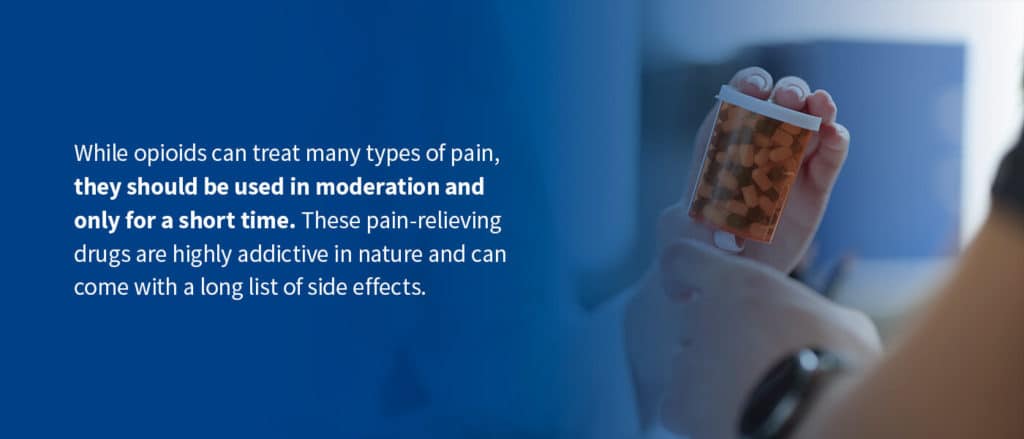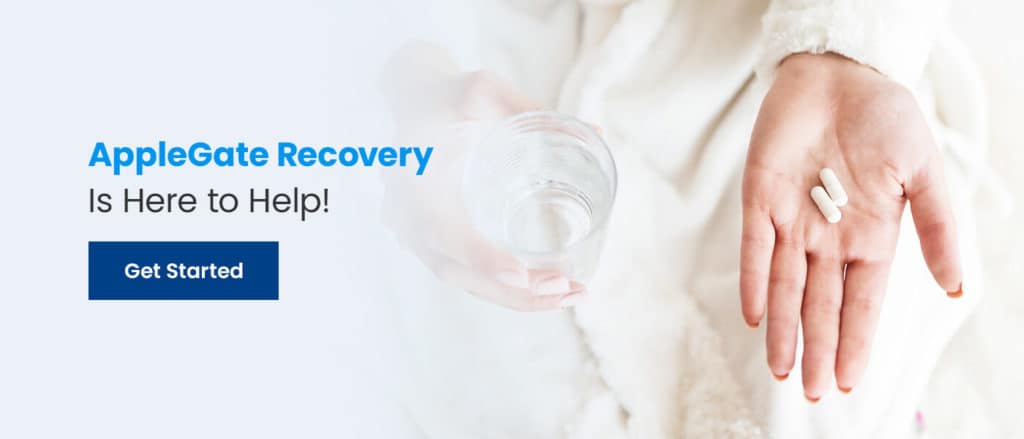
In most cases, when a person recovers from surgery or has experienced a severe injury, doctors prescribe pain medication. While there is nothing wrong with taking pain medicine, some medication types have a higher risk of addiction than others. When patients have major surgery or serious injury, doctors often prescribe an opioid to help their patients deal with any pain and assist in their healing. This pain relief can allow people to feel better and have an easier time during recovery.
Opioids and medical procedures can go hand in hand, but using drugs of this type requires caution. Opioids should only be taken as directed, as a highly addictive drug can change a person’s behavior before they know it.
After years of an opioid epidemic, it is time to spread the signs and symptoms of opioid addiction. Learn more about how to use opioids safely and understand the signs of addiction.
Medical Purposes and Benefits of Opioids
Opioids are drugs that provide relief for severe pain. Doctors prescribe many different types of opioids for different reasons and areas of pain. These types of drugs work to relieve pain by blocking a natural signal in a person’s brain. When someone takes an opioid, that person’s brain will not receive signals from the body indicating that they are in pain. Blocking these signals allows for pain relief and creates a state of relaxation to aid in a patient’s post-medical procedure recovery.
The main purpose of prescribing these drugs is to improve recovery while reducing the pain level that a patient might experience. Doctors prescribe opioids for chronic back or headache pains, post-operation recovery, and relief from the pain associated with cancer. Physicians also prescribe opioids for unexpected incidents, such as injuries from an auto accident, a sports injury, or a bad fall. These drugs also provide pain relief for short-term recoveries, like wisdom teeth removal.
When monitored closely and taken safely, opioids offer a few benefits for treating moderate to severe pain. Opioids for medical use can provide the following benefits:
- Chronic pain relief
- Heightened relaxation
- Improved mood
Opioids can help improve a patient’s quality of life and help them recover from a medical procedure or injury with less pain.

Tips on Using Opioids Safely
While opioids can treat many types of pain, they should be used in moderation and only for a short time. These pain-relieving drugs are highly addictive in nature and can come with a long list of side effects. While taking an opioid, a person might build up a tolerance for the medicine, which is a common side effect of these drugs. If a person takes opioids for a long period, they might require a higher dosage overtime to reach the same level of pain relief. An increase in tolerance can mean an increased dependence, which is why opioids can be highly addictive, especially when misused.
These drugs are highly successful in relieving pain after a medical procedure or severe injury, but it is critical to remember that opioids affect everyone differently. Just by taking an opioid, a person is at risk of developing an addiction in the future. If a doctor has prescribed opioids for you or a loved one, follow these tips to help ensure your safety:
- Talk to your doctor before taking opioids.
- Take medication only as prescribed by your doctor.
- Tell your doctor if you have any history of drug misuse in your family.
- Ask your doctor what other medications you can take while also taking an opioid.
- Don’t take opioids for long-term pain.
- Don’t crush, break, chew or dissolve pills.
- Don’t consume alcohol while taking opioids.
- Know the risks and side effects of taking opioids.
- Stick to the lowest dose.
You must keep opioids stored in a secure place for the safety of everyone in the household. If there are children present, be sure to keep opioids out of reach or in a locked, secure area. An accidental adult-sized dose of opioids could result in an overdose for a child. It is also a good idea to store all your medications together in a private place to reduce the risk of others abusing the medicines.
When Should I Seek Help?
There are many misconceptions about opioid recovery, and it can feel overwhelming and difficult to reach out for help. However, you should know that you are not alone. More than 3 million United States citizens have experienced or are currently struggling with opioid addiction, and more than 16 million people are affected worldwide.
Knowing the signs and symptoms of opioid addiction is the first step to recognizing there might be a problem. As opioids can affect everyone differently, it is important to talk to your doctor if you notice any irregularities or if you think that you might be becoming dependent on the medicine. It can be challenging to see those signs in yourself, so you might ask a trusted family member or friend to help you monitor your opioid use.
Opioid dependency can include various signs and symptoms. Substance abuse can affect a person psychologically, physically, or behaviorally.
If you take opioids, you should seek help if you:
- Find it hard to stop taking opioids.
- Find it difficult to take only the prescribed dose.
- Take more than the prescribed dose.
- Take medicine not prescribed to you.
- Experience frequent mood swings.
- Feel increased agitation.
- Experience depression or anxiety.
- Have slowed breathing.
- Experience insomnia.
- Have increased headaches.
- Experience lowered motivation.
- Don’t want to stop taking opioids.
You can also use these signs to notice an opioid addiction in friends or family members. The first step is to understand the problem, then seek help.
AppleGate Recovery Is Here to Help!
Opioids are highly addictive and are commonly misused. If you’ve noticed the signs of opioid addiction in yourself or a loved one, it’s time to reach out for help. AppleGate Recovery offers medication-assisted treatment (MAT) programs and opioid addiction counseling services, and we are ready to help you continue your life while working on your recovery.
If you or a loved one is ready to take the next step of recovery, reach out to us today for more information about our opioid addiction treatment options. To learn more about opioid addiction recovery, check out our blog.

Contact AppleGate Recovery Today
If opioid addiction is impacting your life or the life of someone you care about, reach out to our treatment center. We are here to provide the support and care you need to take the first step toward recovery.
Call 888.488.5337

